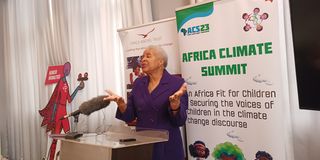Africa Climate Summit: Adolescent girls table demands

Graca Machel during a side-event with adolescent girls at the ongoing Africa Climate Summit.
What you need to know:
- Graça Machel promised to deliver the message to the intended duty bearers.
- She, however, challenged the girls to plant trees in their schools and communities.
“We want our innovations and ideas to be integrated into government policies and interventions.”
Cherop Soy, a youth ambassador, made this remark on Monday in reference to the ongoing Africa Climate Summit where Africa’s heads of state and governments, global humanitarian leaders, policymakers, practitioners, businesses and civil society have met to deliberate on advancing green growth and finding workable climate financing solutions.
She spoke at a side-event where adolescent girls and young women from the continent met Graça Machel, co-founder and deputy chair of the Elders. She also founded Graça Machel Trust in 2010, a Pan-African entity devoted to promoting children’s rights and women’s socioeconomic empowerment.
The girls want the African governments to fund them to run tree planting initiatives in schools and in their communities, invest in water infrastructure to save them from sexual abuse on the way to water points miles away, and provide their pastoralist fathers with livestock insurance to protect them from being sold into early marriage to replenish family flocks.
less talk, more action
They also challenged leaders to speak less and do more. “Leaders just talk too much… We need more action,” said Karen Kimani, a 10-year-old environmental ambassador from Kenya.
“Air pollution is killing children. There is indiscriminate disposal of waste in Dandora, Korogocho and Kibera, and children are dying from the pollution. What are you going to do to change that?
“We need to plant more trees. For instance, in my school, I have started an environmental club where I am the secretary for environment and advise my fellow pupils to plant trees corresponding to their age. For instance, if I am turning 11, I plant 11 trees and I also bring along 11 friends to plant 11 trees to mark my birthday.”
Peace Newangan, who hails from Kajiado County, said the future of girls can no longer be sacrificed as a result of the adverse impacts of climate change on the communities.
Also read: Women, girls key to climate change action
“During droughts, livestock die and to the Maasai, that is loss of wealth takes its toll on the health of fathers,” said the 15-year-old.
“They develop high blood pressure and they are thinking: ‘How can we regain our wealth?’”
She gave an example of a family that lost 50 cows during the recent drought and to restock, the father forced his two underage daughters into marriage after subjecting them to female genital mutilation, which, according to the Maasai community, is a precondition to getting a suitor.
Rights protection
“We want a future where girls can flourish and thrive. We have to unite to defend our daughters and protect their rights. Through education and love, we will break the chains and create a future where equality and freedom reigns,” she said, calling for action through a poem she had composed to mark the event.
They presented their demands to Graça, who promised to deliver the message to the intended duty bearers. “What I can definitely promise you is that what you have said here…they will get to the table of the heads of state, ministers of Health [and] ministers of Education. We will send it to the African Union as well,” she said.
“Next year, I will tell you how many people directly received your demands and of those how many have taken your demands into account.”
Graca, however, challenged each of them to follow in the footsteps of Karen and plant trees in their schools and communities. “Make sure you find a way of planting trees and you count so that when I come back to report what I have done, you also do say in one year in Sierra Leone, in Kenya, in Tanzania, these are the trees we planted as an initiative by us as adolescent girls,” she said.
“You know why? Because this is going to be the best lesson you can give to us who promise but then don't do [what we have promised].”





